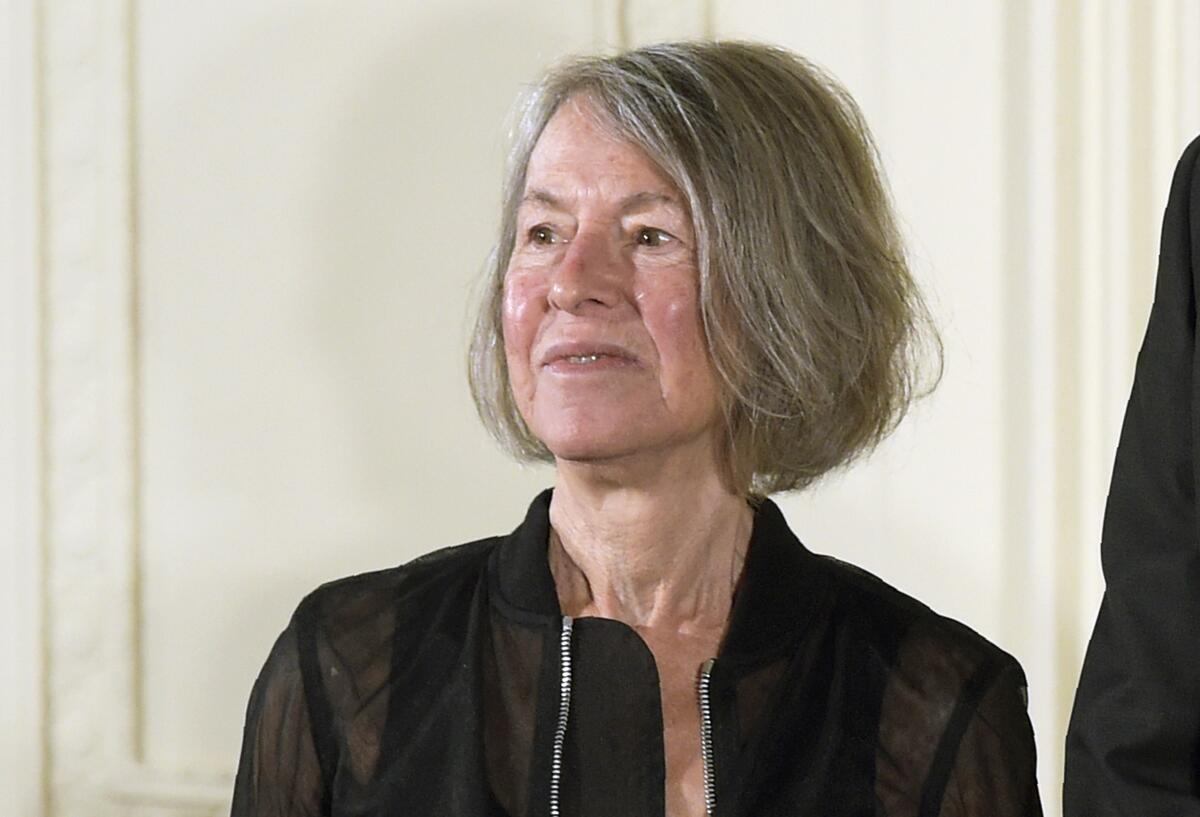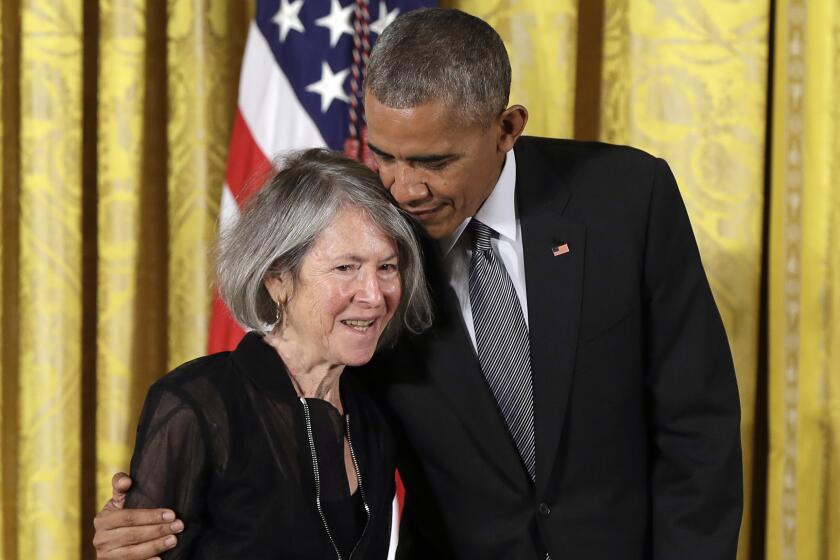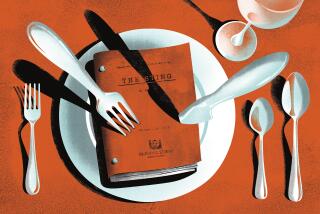Louise Glück, former U.S. poet laureate and Nobel winner who wrote with ‘austere beauty,’ dies at 80

Louise Glück, the witty, candid and uncompromising former U.S. poet laureate who won the 2020 Nobel Prize in literature and a Pulitzer Prize in 1993, has died. She was 80.
Glück’s death was confirmed Friday to The Times by Jonathan Galassi, her longtime editor at Farrar, Straus & Giroux. No details about her cause of death were immediately provided.
“Louise Gluck’s poetry gives voice to our untrusting but unstillable need for knowledge and connection in an often unreliable world,” Galassi said in a statement. “Her work is immortal.”
Glück was the first American woman to win the Nobel Prize in literature since Toni Morrison in 1993 and the first American poet so honored since T.S. Eliot in 1948. The Swedish Academy’s prize committee recognized Glück for her “unmistakable poetic voice that with austere beauty makes individual existence universal.”
Her literary career began with the aptly named collection “Firstborn,” published in 1968. Other acclaimed works include “Ararat” and “The Triumph of Achilles” from 1985, which won the National Book Critics Circle Award. She attended Sarah Lawrence College and Columbia University and was a member of the American Academy of Arts and Letters.
A professor at Yale and a resident of Cambridge, Mass., Gluck served as U.S. poet laureate from 2003 to 2004. She also won the Pulitzer Prize in 1993 for her poetry collection “The Wild Iris,” in which she described “the miraculous return of life after winter” in the poem “Snowdrops.” She also won the 2014 National Book Award for poetry for “Faithful and Virtuous Night.”
Poet Louise Glück wasn’t ready for her early-morning interview about winning this year’s Nobel Prize in literature. But her reaction was certainly amusing.
Her 2012 collection, “Poems 1962-2012,” won the Los Angeles Times Book Prize, and in 2016 President Obama presented her with the National Humanities Medal in a White House ceremony.
Her oeuvre included 12 collections of poetry and two volume of essays on literary writing — “Proofs and Theories” and “American Originality” — and was largely preoccupied with childhood and family relationships as well as her pursuit of clarity. Her 2006 collection, “Averno,” is considered a masterwork for what the Nobel Committee for Literature described as its “visionary interpretation of the myth of Persephone’s descent into hell in the captivity of Hades, the god of death.”
“She seeks the universal, and in this she takes inspiration from myths and Classical motifs,” said Anders Olsson, the chairman of the committee, when Glück won the prize in 2020.
The publicity-shy author famously had an ornery reaction to that win, giving an interviewer who broke the news “two minutes” on the phone to ask his questions so that she could have her morning coffee.
For those unfamiliar with her work (admitting that “many” were), the self-aware author noted that there isn’t really a good place to start “because the books are very different, one from another.”
“I would suggest that they not read my first book unless they want to feel contempt,” she quipped.
Glück was also diffident about prosperity. In a 2012 interview, she acknowledged that prizes can make “existence in the world easier” but doubted that they could guarantee the work’s immortality.
She ascribed her accolades to the fact that she wrote poems “that accorded with the tastes of the period,” viewing them as “taunts” of what she “could do once.” It was teaching all over America — in North Carolina, Ohio and across UC campuses in Berkeley, Davis, Irvine and Los Angeles — that unnerved and excited her, allowing her to feel “a thrill that never abated.”
In “Theory of Memory,” her fifth poem from “Faithful and Virtuous Night,” Glück wrote: “Long, long ago, before I was a tormented artist, afflicted with longing yet incapable of forming durable attachments, long before this, I was a glorious ruler uniting all of a divided country — so I was told by the fortune-teller who examined my palm.
“Great things, she said, are ahead of you, or perhaps behind you; it is difficult to be sure.
“And yet, she added, what is the difference? Right now you are a child holding hands with a fortune-teller. All the rest is hypothesis and dream.”
Born April 22, 1943, in New York City, Glück was her parents’ second child “but the first to survive.” Her father was a businessman and a dreamer who created hundreds of inventions and founded X-Acto, known for its famous knives, with his brother-in-law. Her mother was a housewife and “celebrated cook” who she said was “well-educated but without any particular sense of vocation.”
“Nevertheless, she had the temperament and stamina and force of an empire builder,” Glück wrote.
Three years after her birth came a younger sister, and the family moved to Long Island, which she described as “a prosperous Jewish suburb on the south shore.”
“These were, as far as I could judge, communities of displaced New Yorkers, mainly second and third generation,” she said. “There was little sense, in such places, of Europe; certainly, there was very little sense of Hungary or Russia in my house. No language was spoken other than English, aside from my mother’s Wellesley French major French in ceremonious bursts and, less frequently, Japanese phrases she acquired when she and my father lived in Japan.”
Poet Louise Gluck has won the Nobel Prize in literature, the first American woman to be so honored since Toni Morrison in 1993.
She started reading at a very early age, consuming the Greek myths and Oz books. Her father would read her “Joan of Arc” at bedtime — omitting the final burning — and taught his daughters to write books.
“We made up stories, which he transcribed for us on squares of paper that were folded to make pages, a certain number of words on each, leaving room for us to draw pictures. Somewhat later, but not much later, I found an anthology of poetry. Reading Blake and Shakespeare, I felt intensely that these were the people I wanted to be talking to. I wanted to be what they were,” she said.
She did well in school but not so much socially, describing herself as never being “light-hearted and merry; rather, anxious and twitchy” and “a very tense child.”
She attended Catholic school in France and said that her household affirmed “a sense of the unlimited power of women,” even if the world around her didn’t.
Graduating high school a year early, she also finished what she believed to be her first book at 16. She sent it to publishers “with no timidity or sense of irony,” and although “it ended up in a box,” lines she wrote at 13 and 15 would later show up in “reconstituted poems.”
“Haunted by syntax,” Glück said she read work by John Keats, Emily Dickinson, William Butler Yeats and British novels as a teen. A bout with anorexia landed her in psychotherapy, and that “saved me from the narrower and narrower worlds I constructed for myself, from the arid brevities of my poems at that time.” The poet, who also had epilepsy, said the seven years she spent in analysis “radically changed” the course of her life: “They made my life possible, really.”
She was married twice and had one son, Noah Dranow, who survives her.
Times staff writer Henry Chu contributed to this report.
More to Read
Sign up for our Book Club newsletter
Get the latest news, events and more from the Los Angeles Times Book Club, and help us get L.A. reading and talking.
You may occasionally receive promotional content from the Los Angeles Times.










